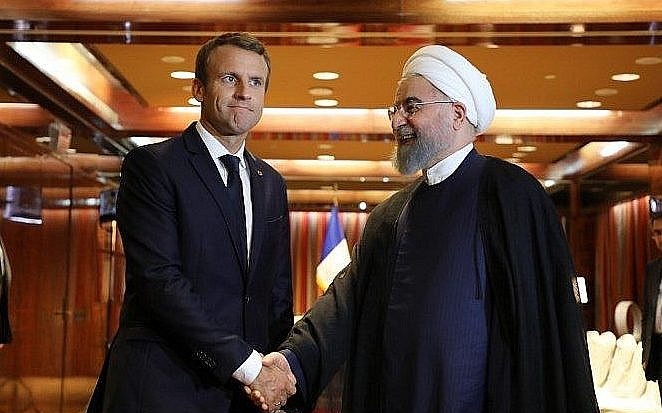French President Emmanuel Macron (L) and Iranian counterpart Hassan Rouhani, New York, September 19, 2017 (Ludovic Marin/AFP)
French President Emmanuel Macron is trying to pull back Iran and the US from confrontation, with mediation between Tehran and Washington.
Macron spoke for more than an hour with Iranian counterpart Hassan Rouhani on Saturday, and then with Donald Trump yesterday.
A brief White House readout of Monday’s conversation tried to present Macron’s unqualified support for the Trump Administration’s “maximum pressure” on Tehran: “They discussed ongoing efforts to ensure that Iran does not obtain a nuclear weapon and to end Iran’s destabilizing behavior in the Middle East.”
Washington’s summary was in sharp juxtaposition to Rouhani’s line of a path to negotiations, “Halting all sanctions can be the start of new movement between Iran and the 5+1”, the signatories of the 2015 nuclear agreement (US, UK, France, Germany, China, and Russia).
Meanwhile, Macron’s office is carefully positioning between the two powers. It said the French President expressed “deep concern” to Rouhani over any further suspension of Iran’s commitments under the 2015 nuclear deal, warning that there would be consequences.
Rouhani’s office presented Macron’s words far differently:
The EU wants the JCPOA [Joint Comprehensive Plan of Action] to survive, and we are doing our utmost in this regard….Collapse of the JCPOA will mean admitting to a collective failure and a deplorable incident, therefore, we have to choose a second path to save the JCPOA and contribute to the de-escalation of tensions.
Macron’s office rephrased that statement: “The important thing in a crisis situation such as this one is to find the middle points that take us from extreme tension to negotiation, that’s what we’re trying to do.”
Iran Repeats Challenges Over Nuclear Deal, British Seizure of Tanker
But before Macron’s call with Trump, Iran issued a new challenge with the announcement that it is exceeding the nuclear deal’s limit on uranium enrichment of 3.67%.
Officials confirmed that enrichment of up to 5% is being pursued for fuel for a nuclear reactor. Atomic Energy Organization spokesman Behrouz Kamalvandi said Iran may resume its pre-2015 production of 20% uranium, which can be further enriched to a military grade of more than 90%.
See also Iran Daily, July 7: Tehran Breaks Nuclear Deal’s Limit of 3.67% Uranium
On Tuesday, the head of Iran’s armed forces Maj. Gen. Mohammad Hossein Bagheri repeated the threat of retaliation after UK and Gibraltar security forces boarded and impounded an Iranian supertanker last week.
The UK said the supertanker, with a capacity of 2 million barrels of oil, was en route to Syria in violation of European Union sanctions. But Bagheri said in a speech in Tehran that London’s motive was to counter the Iranian downing of a US drone last month.
The UK’s action was in retaliation of the Iranian Armed Forces’ brave move to down the enemy’s intruding drone. The UK’s move will not be left without response; if necessary, Iran will give a proper response to the act at an appropriate time and place.
On Monday, Iran’s Defense Minister Brig. Gen. Amir Hatami proclaimed, “These kind of robberies will not be tolerated.”
Iran Daily, July 8: “We Will Not Tolerate Britain’s Seizure of Our Tanker”


Trackbacks/Pingbacks